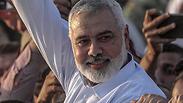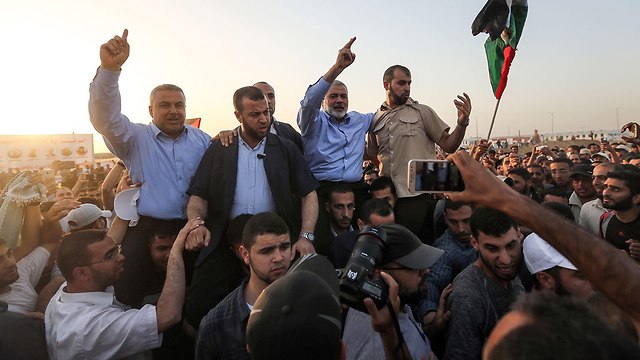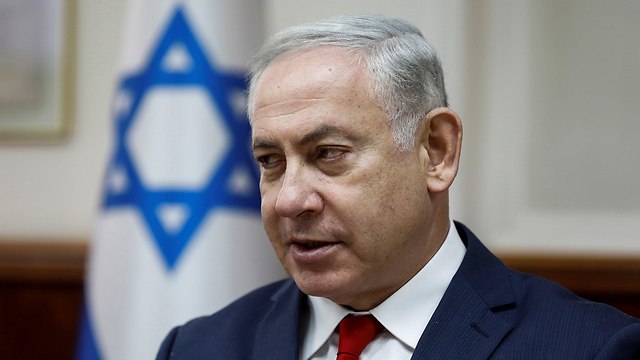


Toppling Hamas is the only logical solution
Op-ed: We’ve been through three rounds of fighting, we’ve imposed an economic blockade on Gaza, we’ve reached a ‘hudna,’ we’ve invested billions in the Iron Dome system, in uncovering tunnels and in building a fence and a sea barrier—to no avail. Eventually, we’ll have no choice but to bring Hamas down, so why not now?
We imposed an economic blockade on Gaza. We reached a “hudna” with Hamas, which violated it shortly afterwards, of course. We invested billions in defense measures—the Iron Dome system, uncovering tunnels, building a fence and a sea barrier. Nothing helped. The Hamas terrorism continued even after the organization imposed a horrible humanitarian reality on Gaza’s two million residents.
The thought that Gaze can be rebuilt and that its residents can enjoy some relief under the Hamas rule is baseless—just like the arrogant declarations made by prime ministers and defense ministers after every operation, that Israel dealt Hamas a decisive blow.

The Hamas rule could have been eliminated in Operation Cast Lead. We were just 2 kilometers away from the Hamas leaders, who were hiding in the Al-Shifa Hospital. Then-defense minister Ehud Barak was against it, and he imposed his opinion on Prime Minister Ehud Olmert, who was at the end of his term. Since then, we have been dominated by the conception of “co-existence,” or rather “co-death,” with Hamas.
In 2009, several days before the elections, then-opposition leader Benjamin Netanyahu stood at the gates of Gaza and firmly vowed to bring down the Hamas rule, unlike the “weak” Olmert government. That promise was one of the reasons Netanyahu won the elections.
After he was elected, he adopted Barak’s stance and preferred to perpetuate the Hamas rule and the split between the PA rule in the West Bank and Hamas in Gaza. Even during Operation Protective Edge, Netanyahu favored negotiations with Hamas over toppling the organization, although the world in general—and the moderate Arab states, led by Egypt, in particular—called for an end to the Hamas rule. Even recently, when the PA demanded to restore its military and civilian control of Gaza, Netanyahu kept favoring the Hamas rule in the strip.
As we know, the PA has imposed sanctions on Hamas in Gaza. Not so long ago, Netanyahu warned the PA that if it didn’t lift the sanctions, he would cut the funds the PA revoked from Hamas from the funds Israel transfers to the PA. That’s how devoted Bibi has become to the Hamas rule in Gaza.
Egypt, Saudi Arabia and the Gulf states still want to remove Hamas and restore the PA rule in Gaza, but Bibi is standing strong against these trends and preventing cooperation with the moderate Arab states against Hamas. The reason is that he’s afraid the PA’s return to Gaza will make it politically stronger and then, God forbid, he’ll have to negotiate with one Palestinian entity representing both Gaza and the West Bank.
Many in the Right prefer a continuation of the current situation, arguing that Gaza is the Palestinian state and that there is no need to establish another Palestinian state, even if Gaza is controlled by a terror organization. The PA’s return to Gaza will make their argument invalid.
The claim that toppling Hamas could lead to a worse rule (as if there could be anything worse than Hamas and Islamic Jihad) is ridiculous. It’s perfectly clear that Hamas would be replaced by the PA and no one else.
The IDF waged a day of battle Tuesday against an ephemeral organization like Islamic Jihad, which operates under the auspices of Hamas. It’s absurd. Israel, the country with the strongest army in the Middle East, is letting Hamas claim lives and make the lives of Israel’s residents in general, and the Gaza border area residents in particular, a misery for more than a decade now.
We’ve already tried everything, apart from the only logical solution—eliminating the rule of terror, the Iranian branch in southern Israel. Eventually, we’ll have no choice, and sooner or later we’ll bring Hamas down, so why not now?
Haim Ramon served as a Knesset member and minister from 1983 to 2009 on behalf of the Labor Party and Kadima.
















